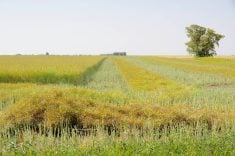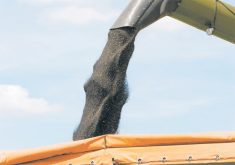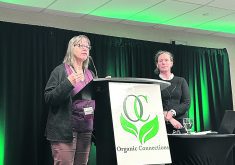The federal government may need to update its regulations to deal with gene-edited crops, says a spokesperson for CropLife Canada.
Companies are developing new crop varieties using a technology called gene editing, in which biologists can precisely delete or add a gene to a plant’s DNA.
However, leaders of crop science firms want to know that Canadian regulations are in place before they commit millions of dollars in research.
“If you are someone who wants to innovate … the clarity of how the regulatory system will react is critical to making that investment decision,” said Ian Affleck, executive director of plant biotechnology with CropLife Canada.
Read Also

Saskatchewan throne speech promises strong economy
Saskatchewan’s legislative agenda for the coming year will focus on meeting the challenges of new world trading relationships, said the speech from the throne.
“It is very important that any government spends the time to modernize the regulatory systems to appropriately address the new technologies.”
Gene editing may be the most promising innovation in the world of crop science in the last decade. A gene editing technique known as CRISPR-Cas9 is generating buzz and an immense amount of agricultural media coverage. Scientists and companies think it could dramatically reduce the speed and cost of getting new crop varieties and traits to market.
“Monsanto believes gene-editing technologies have the potential to improve a number of crops within our current research portfolio, which includes corn, cotton, soybeans, canola, wheat and fruits and vegetable crops,” said Camille Scott, who works in scientific communications with Monsanto.
In January, the U.S. Department of Agriculture released a regulatory proposal to deal with gene-edited crops and other biotechnologies.
The department said new crop varieties created with gene editing may be treated the same as traditional techniques such as mutagenesis.
“It (the proposal) does speak to the idea that new techniques, (which) result in products indistinguishable from conventional breeding, will not be regulated,” Affleck said.
The USDA also said there may be instances where genome editing poses more risk than traditional methods. In those cases, the technology may be subject to pre-market assessment.
The department’s recommendations are a proposal, so the final rules could be significantly different.
Nonetheless, the U.S. government is adjusting its systems to deal with gene-edited plants.
“The U.S. is one of many countries that have recognized the need to modernize their regulatory systems,” Affleck said.
“Unlike the U.S. and Australia, the Canadian government is not engaged in any policy consultation on these products (new plant science technologies).”
In response, the Canadian Food Inspection Agency confirmed that Canada isn’t working on its plant biotechnology regulations to accommodate gene editing.
The CFIA said in an email that it has a regulatory system that doesn’t need “to be updated” for the latest and greatest technologies.
“New plant breeding techniques (like CRISPR) are additional tools for plant breeders that complement existing methods ranging from conventional plant breeding to modern biotechnology,” the agency said.
“In Canada, the approach to regulatory oversight is based on the novelty of the product rather than the means of development…. When the breeding/development process leads to a novel trait, mandatory pre-market assessment is triggered…. This would be the case for novel plant products derived from new breeding techniques such as CRISPR-Cas9.”
Affleck said this issue is larger than gene editing. He said Canada and most countries need to modernize the rules for established crop biotechnology because it’s been around for a generation.
















